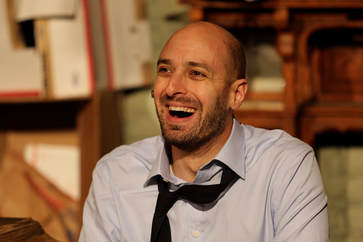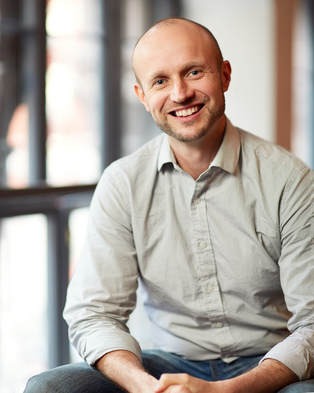 1-In your own words, describe the productions? Including key themes and conflicts…why is this the right time for this production? Each of the five Genesis Plays puts a story from the book of Genesis in conversation with the lived experiences of a different community around the United States. In Minneapolis we examined Abraham's legacy as a patriarch as it relates to the relics we inherit and pass along. It's a solo show, but it doesn't feel like one. It's a scavenger hunt where the audience holds all the clues. And I feel this play challenges us to face the fact that we can run from our family, but we can't run from our inheritance. In Charleston, in the aftermath of the massacre at Mother Emmanuel AME, we explored parental favoritism through the story of Rebecca and the prophesy she received while pregnant with twins, among whom she then played favorites. This play is extremely relevant as an exploration of parental favoritism as a stand-in for systemic favoritism in America over our history and still today. In Austin we layered gentrification over the story of Jacob, who presumes cultural hegemony only to be confronted with the challenges of integrating with unfamiliar customs. As immigration battles rage in America and around the world, this play moves on to the ignored conversation about culture you bring with you and culture you adopt. In Seattle we explored how history is written by men, even in the bible. And in response we explored the concept of sisterhood, the voices of biblical women, and the sibling relationship of Leah and Rachel. In Kansas City we worked with the Muslim and Jewish communities to explore Sarah and Hagar, Abraham's wives and the mothers of Isaac and Ishmael in a play that became a meta-examination of how we tell stories that carry multiple, conflicting truths. 2-Who are your collaborators and what do you like about working with them? Our core artist team collaborated everywhere we went. In Charleston we worked with Darian Dauchan, an NYC based actor/poet/playwright who brought his fierce artistry to the work and Charleston-based actress/director Joy Vandervort-Cobb who became our guardian angel in that city and beyond. The project in Austin was a wrestling show devised in collaboration with Aztlan Dance Company, one of whose dancers Luis Ordaz, is reprising his role in NYC. Brandon Blake, a musician from Seattle, will be flying out to recreate his work in the Leah/Rachel play and he brings such infectious joy with him everywhere he goes. Ilana Trachtman is an emmy award winning film director who produced and directed the film for the Leah/Rachel play and her incredible talent and experience have made adapting the piece for the NYC stage so much fun! 3-Who is the typical audience for the production? What do you want audiences to get out of the show (ie: feel when they leave the theater)? One of the most exciting things about these plays is that they are cutting edge and primal at the same time. A WWE-inspired wrestling event that also has elements of the bible; a play about the history of race in Charleston told through poetry and movement, a multi-media film/theater piece set just slightly in the future. Each play is completely different from the other and yet they were all inspired by the same ancient book. I would say the typical audience for these shows is passionate about the world we live in while also curious about what we can learn from those who came before us. People in their 20s and 30s who are just starting to figure shit out and gain some perspective while maintaining a life of adventure and discovery - I think they'd love these plays because they live on that edge of future and past. And my hope is that people leave with more questions than answers, that they are inspired to go read some stuff 4-Who is someone (or something) who has inspired you? I'm really inspired by Miranda July. Over and over again she creates art that engages people at every phase of the artistic process, empowering them as participants and not just witnesses. We strive to do the same thing with the In[heir]itance Project in communities around the country. 5-Why theatre, when did you know you wanted to be a director? (I'm not a director, I'm an actor and playwright) I've always wanted to be an actor. But growing up in Memphis I thought I had to be a Gene. (Hackman, Wilder, Kelly) I thought I had to be serious, be funny, or sing and dance. But in college at NYU's Tisch School of the Arts, I started realizing there were so many more ways to tell stories on stage. I first learned about devised theater at the Experimental Theater Wing and I was hooked. The idea of making art in community for community really excited me. And devised theater is what I've done almost exclusively ever since!
2 Comments
 JEREMY J. KAMPS (Brietwisch Farm Playwright) is a current member of the Public Theater Emerging Writers Group, Playwright-in-Residence for Esperance Theater Company and Spectrum Theater Ensemble. Recent productions include Runaway Home at the Fountain Theater in Los Angeles and 13th Point at The Public Theater Joe’s Pub. His plays have received awards and recognition including: The William Saroyan Human Rights Award Finalist 2016, Page 73 Semi-Finalist (2017), The Ruby Lloyd Apsey Award (Gutting), The Goldberg Prize, Woodward International Playwriting (What It Means To Disappear Here), Hudson Valley Writers Center and the NYU Festival of New Works (Water Hyacinth). Selected productions include Gutting, presented by the National Black Theatre of Harlem in Fall of 2015, What It Means To Disappear Here (Ugly Rhino, NYC) in spring of 2013. His work has been produced/developed with Esperance Theater Company, Company Cypher at the National Black Theatre of Harlem, Ugly Rhino, Dixon Place, Hudson Valley Shakespeare, The Amoralists and New York Theatre Workshop. His fiction has received publication in The Madison Review as well as the H.E. Francis Award (“The Source of Everything”), the Tom Howard/John Reid Fiction Prize (“Drawing Water”), The Little Patuxent (“Locked Out”), Lamar York Prize finalist and recognition in Glimmertrain, Inkwell, The Caribbean Writer, and New Millenium. As an educator and activist, Jeremy has lived and worked for lengthy periods of time in Latin America, India and East Africa where he focused on support and empowerment for former child soldiers, displaced peoples and child rights. He received the Theatre Communications Group “On the Road” grant in 2015 to return to Kenya where he conducted drama workshops as part of his research for a new play on flower farms. After 8 years as a full-time middle school classroom teacher, Kamps has facilitated drama and writing workshops around the world and of all ages. His most recent partnerships being with Rikers Island Correctional Facilities and Newark Community Solutions focused on men re-entering society after incarceration. MFA: New York University Tisch School of the Arts in Dramatic Writing. Upcoming: Runaway Home at Southern Repertory Theater (NYC). |
KampfireSomething NEW regularly about our amazing clients. Categories
All
Archives
August 2019
|

 RSS Feed
RSS Feed